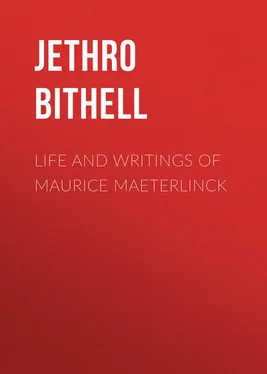Jethro Bithell - Life and Writings of Maurice Maeterlinck
Здесь есть возможность читать онлайн «Jethro Bithell - Life and Writings of Maurice Maeterlinck» — ознакомительный отрывок электронной книги совершенно бесплатно, а после прочтения отрывка купить полную версию. В некоторых случаях можно слушать аудио, скачать через торрент в формате fb2 и присутствует краткое содержание. ISBN: , Жанр: foreign_antique, foreign_prose, на английском языке. Описание произведения, (предисловие) а так же отзывы посетителей доступны на портале библиотеки ЛибКат.
- Название:Life and Writings of Maurice Maeterlinck
- Автор:
- Жанр:
- Год:неизвестен
- ISBN:http://www.gutenberg.org/ebooks/38917
- Рейтинг книги:3 / 5. Голосов: 1
-
Избранное:Добавить в избранное
- Отзывы:
-
Ваша оценка:
- 60
- 1
- 2
- 3
- 4
- 5
Life and Writings of Maurice Maeterlinck: краткое содержание, описание и аннотация
Предлагаем к чтению аннотацию, описание, краткое содержание или предисловие (зависит от того, что написал сам автор книги «Life and Writings of Maurice Maeterlinck»). Если вы не нашли необходимую информацию о книге — напишите в комментариях, мы постараемся отыскать её.
Life and Writings of Maurice Maeterlinck — читать онлайн ознакомительный отрывок
Ниже представлен текст книги, разбитый по страницам. Система сохранения места последней прочитанной страницы, позволяет с удобством читать онлайн бесплатно книгу «Life and Writings of Maurice Maeterlinck», без необходимости каждый раз заново искать на чём Вы остановились. Поставьте закладку, и сможете в любой момент перейти на страницу, на которой закончили чтение.
Интервал:
Закладка:
Life and Writings of Maurice Maeterlinck
"Maurice Maeterlinck. – Il débuta … dans La Pléiade par un chef-d'œuvre: Le Massacre des Innocents . Albert Mockel devint plus tard son patient et infatigable apôtre à Paris. C'est lui qui nous fit connaître Les Serres Chaudes et surtout cette Princesse Maleine qui formula définitivement l'idéal des Symbolistes au théâtre."
STUART MERRILL, Le Masque , Série ii, No. 9 and 10.PREFACE
It is not an easy task to write the life of a man who is still living. If the biographer is hostile to his subject, the slaughtering may be an exciting spectacle; if he wishes, not to lay a victim out, but to pay a tribute of admiration tempered by criticism, he has to run the risk of offending the man he admires, and all those whose admiration is in the nature of blind hero-worship. If he is conscientious, the only thing he can do is to give an honest expression of his own views, or a mosaic of the views of others which seem to him correct, knowing that he may be wrong, and that his authorities may be wrong, but challenging contradiction, and caring only for the truth as it appears to him.
So much for the tone of the book; there are difficulties, too, when the lion is alive, in setting up a true record of his movements. If the lion is a raging lion, how easy it is to write a tale of adventure; but if the lion is a tame specimen of his kind, you have either to imagine exploits, making mountains out of molehills, or you have to give a page or so of facts, and for the rest occupy yourself with what is really essential.
When the lion is as tame as Maeterlinck is (or rather as Maeterlinck chooses to appear), the case is peculiarly difficult. The events in Maeterlinck's life are his books; and these are not, like Strindberg's books, for instance, so inspired by personality that they in themselves form a fascinating biography. They reveal little of the sound man of business Maeterlinck is; they do not show us what faults or passions he may have; they tell us little of his personal relations – in short, Maeterlinck's books are practically impersonal.
The biographer cannot take handfuls of life out of Maeterlinck's own books; and it is not much he can get out of what has been written about him, very little of which is based on personal knowledge. Maeterlinck has always been hostile to collectors of "copy," those great purveyors of the stuff that books are made of. Huret made him talk, or says he did, when Maeterlinck took him into the beer-shop; and a few words of that interview will pass into every biography. That was at a time when he hated interviews. He wrote to a friend on the 4th of October, 1890:
"I beg you in all sincerity, in all sincerity , if you can stop the interviews you tell me of, for the love of God stop them. I am beginning to get frightfully tired of all this. Yesterday, while I was at dinner, two reporters from … fell into my soup. I am going to leave for London, I am sick of all that is happening to me. So if you can't stop the interviews they will interview my servant." 1 1 Gérard Harry, Maeterlinck , p. 18.
This is not a man who would chatter himself away, 2 2 "Monsieur Maeterlinck being as all the world knows, hermetically mute." – (Grégoire Le Roy), Le Masque (Brussels), Série ii, No. 5 (1912).
not even to Mr Frank Harris, who found him aggressive (and no wonder either if the Englishman said by word of mouth what he says in print, namely that The Treasure of the Humble was written "at length" after The Life of the Bee , Monna Vanna , and the translation of Macbeth ! 3 3 " La Vie des Abeilles brought us from the tiptoe of expectance to a more reasonable attitude, and Monna Vanna and the translation of Macbeth keyed our hopes still lower; but at length in Le Trésor des Humbles Maeterlinck returned to his early inspiration." — Academy , 15th June, 1912.
). The fact is, there is very little printed matter easily available on the biography proper of Maeterlinck. It is true we have several accounts of him by his wife in a style singularly like his own; we have gossip; we have delightful portraits of the houses he lives in – but we have no bricks for building with.
A future biographer may have at his hands what the present lacks; but I for my part have no other ambition for this book than that it should be a running account of Maeterlinck's works, with some suggestions as to their interpretation and value.
JETHRO BITHELL.
Hammerfield,
Nr. Hemel Hempstead,
31st January, 1913.
MAURICE MAETERLINCK
CHAPTER I
Maurice Polydore Marie Bernard Maeterlinck 4 4 The Flemish pronunciation is Màh-ter-lee-nk; but Frenchmen pronounce it as though it were a French name.
was born at Ghent on the 29th of August, 1862. It is known that his family was settled at Renaix in East Flanders as early as the fourteenth century; and the Maeterlincks are mentioned as burghers of Ghent in the annals of Flanders. The name is said to be derived from the Flemish word "maet" (Dutch "maat"), "measure," and is interpreted as "the man who measures out: distributor." In harmony with this interpretation the story goes that one of the poet's ancestors was mayor of his village during a year of famine, and that he in that capacity distributed corn among the poor. Maeterlinck's father was a notary by profession; being in comfortable circumstances, however, he did not practise, but lived in a country villa at Oostacker, near Ghent, on the banks of the broad canal which joins Ghent to the Scheldt at the Dutch town of Terneuzen. 5 5 It was by this canal, no doubt, that Maeterlinck as a young man would skate "into Holland." See Huret's Enquête . And it inspired the scenery of The Seven Princesses .
Here through the paternal garden the sea-going ships seemed to glide, "spreading their majestic shadows over the avenues filled with roses and bees." 6 6 Mme Georgette Leblanc, Morceaux choisis , Introduction.
Those bees and flowers in his father's garden stand for much in the healthy work of his second period. Over the fatalistic work of his first period lies, it may be, the shadow of the town he was born in. Maeterlinck was never absorbed by Ghent, as Rodenbach was by Bruges; but he was, as a young man, oppressed by some of its moods. Casual visitors to Ghent and Bruges may see nothing of the melancholy that poets and painters have woven into them; they may see in them thriving commercial towns; but poets and painters have loved their legendary gloom. "Black, suspicious watch-towers," this is Ghent seen by an artist's eyes, "dark canals on whose weary waters swans are swimming, mediaeval gateways, convents hidden by walls, churches in whose dusk women in wide, dark cloaks and ruche caps cower on the floor like a flight of frightened winter birds. Little streets as narrow as your hand, with bowed-down ancient houses all awry, roofs with three-cornered windows which look like sleepy eyes. Hospitals, gloomy old castles. And over all a dull, septentrional heaven." 7 7 Anselma Heine, Maeterlinck , pp. 7-8.
That hospital on the canal bank which starts a poem in Serres Chaudes 8 8 Serres Chaudes , "Hôpital."
may be one he knew from childhood; the old citadel of Ghent with its dungeons may be the prototype of the castles of his dramas.
One part of his life in Ghent is still a bitter memory to our poet. "Maeterlinck will never forgive the Jesuit fathers of the Collège de Sainte-Barbe 9 9 "The literary history of modern Belgium, by the freaks of chance, was born in one single house. In Ghent, the favourite city of the Emperor Charles V., in the old Flemish city heavy with fortifications, rises remote, far from noisy streets, Sainte-Barbe, the grey-walled Jesuit monastery. Its thick, defensive walls, its silent corridors and refectories, remind one somewhat of Oxford's beautiful colleges; here, however, there is no ivy softening the walls, there are no flowers to lay their variegated carpet over the green courts." – Stefan Zweig, Emile Verhaeren ( Mercure de France , 1910), pp. 39-40.
their narrow tyranny… I have often heard him say that he would not begin life again if he had to pay for it by his seven years at school. There is, he is accustomed to say, only one crime which is beyond pardon, the crime which poisons the pleasures and kills the smile of a child." 10 10 Mme Georgette Leblanc, Morceaux choisis , Introduction.
Интервал:
Закладка:
Похожие книги на «Life and Writings of Maurice Maeterlinck»
Представляем Вашему вниманию похожие книги на «Life and Writings of Maurice Maeterlinck» списком для выбора. Мы отобрали схожую по названию и смыслу литературу в надежде предоставить читателям больше вариантов отыскать новые, интересные, ещё непрочитанные произведения.
Обсуждение, отзывы о книге «Life and Writings of Maurice Maeterlinck» и просто собственные мнения читателей. Оставьте ваши комментарии, напишите, что Вы думаете о произведении, его смысле или главных героях. Укажите что конкретно понравилось, а что нет, и почему Вы так считаете.












